There were only a few blaxploitation movies that hit the big screen before the now infamous and overtly political, socially aware, “Sweet Sweetback's Baadasssss Song”. Produced, directed and starring Melvin Van Peebles, it is considered by many to be the first black film that embodied all that was truly blaxploitation cinema. It had a raw, angry message, taken from the streets, with a more realistic portrayal of black culture than ever before (this mainly because it was a small budget, non-Hollywood picture, hence, no studio interference to stamp it with detrimental racial stereotypes). Starring a morally and ethically rubbery anti-hero, and a hell of a great soundtrack, Peebles’ surprise success became the template for nearly every blaxploitation film to come after it. From “Coffey” to “Super Fly”, from “Hammer” to “Shaft”, they all followed the pattern of black justice getting a little back from the man. The Man was usually a mafia of white crooks, crooked white cops, or in some cases, even black thieves and killers doing an Uncle Tom with white authoritarian figures.
With such successes as “Black Caesar”, “Across 110th Street”, and “Trouble Man” it wasn’t long before someone had the brilliant idea to mix in a little horror. And so was born “Blacula”, the first of a long string of blaxploitation horror films throughout the 70s. “Blacula” was a huge hit, spurring other studios to try their hand at this edgy mix of targeted black entertainment and tales of voodoo, vampires, zombies and devils. But what started as a simple admixture to make bucks soon became some pretty potent black culture message movies. In many, supposed evils sometimes work to dole out justice in the black community, tearing down white law and mafia organizations with equal vigor.
Below we’ve compiled what we think are the best of the halcyon years of blaxpolitation horror. But don’t be surprised to see a few more contemporary titles that we feel continue to carry the flag of cultural awareness and the search for black justice in an unjust society. Okay, okay…some are just fun as hell and had to be included.
13. The People Under the Stairs (1991)

Certainly one of Wes Craven’s strangest efforts (and that’s saying a lot for this director’s iffy canon of films), this tells the story of a ‘haunted house’ in the middle of an urban sprawl where people tend to disappear. What puts this firmly in the blaxploitation horror genre is the outstanding cast of black protags, coupled with the socially affluent, but mentally unstable, white landlords who have a way of trapping their victims in a house of infinite tunnels and holes. This is a story that reeks of social and economic morality warnings, a carryover from the beginnings of the blaxploitation cinema movement in the 70s.
12. Zebra Killer (1974)

William Girdler has not one, but two films on this Top 13. He was a low budget director with a finger on the horror pulse of America. Black fear was a part of the white experience, but Girdler turned that baseless media driven terror on its head in Zebra Killer. Again, a stellar cast of great black actors and actresses made this stand above the usual blax-horror fare.
11. The Thing With Two Heads (1972)
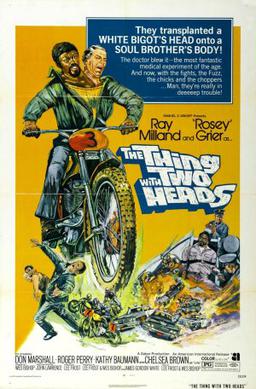
Maybe a bit more unintentionally comedic than the producers intended, but still has strong anti-racist message—albeit one that beats you over the head(s)! Rosie Greer has never been so funny as when he’s talking soul with racist Ray Milland’s head stuck to his shoulder.
10. J.D.’s Revenge (1976)
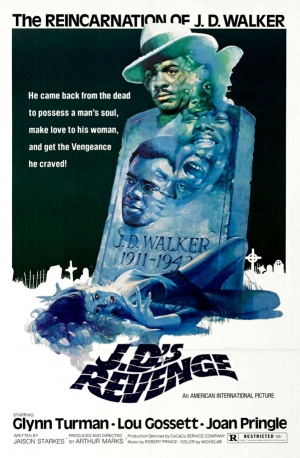
Taking the tried and true mafia revenge story of previous blaxploitation films, J.D.’s Revenge gives it a voodoo twist and makes something quite strange and enjoyable in the horror genre. A strong, believable performance from great character actor, turned lead, Glenn Turman makes it work. He could have given old Barrymore a run for his money when he makes those subtle transitions from the good guy to the dead guy out for blood.
9. Tales From the Hood (1995)
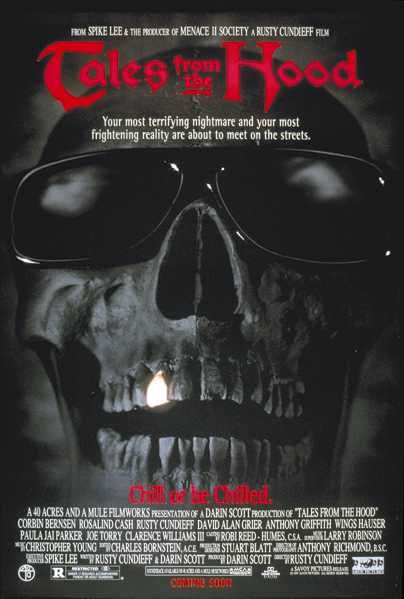
A weirdly watchable Hollywood take on the flagging blaxploitation horror genre coupled with the standard anthology/wraparound story. This was made decades after the great blax-horror movies were in their heyday, but tried hard to capture that same sense of social rage and relevance by making all the whites bad and all the blacks either empowered through their hatred or mistrust of white authority, or naïve and innocent enough to stymie the forces of darkness at work in their urban world. It had a kickass soundtrack from some of the best of gangsta’ rap in the 90s.
8. Ganja and Hess (1973)

Truly one of the weirdest of the blax-horror films to come out of the 70s, it was one of the first to make a minor splash in the burgeoning cinematic horror movement. Starring a man who was already synonymous with black power in horror, Duane Jones (1968’s Night of the Living Dead), it set the standard for playing off the black community’s fear of voodoo and religious mania.
7. Petey Wheatstraw (1977)
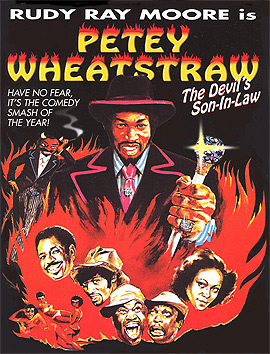
This is not only a classic of the blax-horror movement, but this should be required watching for all horror fans. The great Rudy Ray Moore spends the entire film rhyming his dialogue in interesting and catchy ways, while learning kung-fu and magic from his Bantu. When the devil comes to make a deal, Petey pulls a fast one on Old Scratch. This is more like watching a contemporizing of black folklore than horror, but it still provides some disquieting moments, despite its mostly comedic take on the devil blues story.
6. The House on Skull Mountain (1974)

So what happens when you take the ‘old dark house’ standard storyline and add in a cast of 70s back character actors and actresses? You get maybe one of the strangest takes on the genre. There’s black magic, undead, and Victor French (Highway to Heaven). And two hoorays for those of you reading this who remember the good old days of actors like French who brought charm and verve to their roles.
5. Abby (1974)

The second of our Girdler films on the list is the black take on The Exorcist. In fact, AIP (American International Pictures) got into a bit of trouble because of its similarities to the more popular and financial successful The Exorcist and had to pull the film from theaters. Which, of course, only added to its urban credibility at the time. Starring one of blax-horror’s best known men, William Marshall (see both Scream Blacula Scream and Blacula below), this was part gore, part scare, with Girdler, again, finding the right balance between white and black social fears in his portrayal of a woman possessed by African sex demon.
4. Def By Temptation (1990)

One of the best small budget blax-horror movies ever made. This film provides a much clearer moral and ethical crux upon which the story mush turn. There are no stereotypes here; jus strong performances from some of the brightest of the black actors of the 80s and 90s, including Kadeem Hardison and Samuel Jackson. But the star of the film is director/producer/writer and lead James Bond III, who obviously wanted to turn the blax-horror genre on its head by giving us a vampire story unlike any other vamp film at the time (Craven should have watched this before attempting his lamentable A Vampire In Brooklyn shite). This is a film that deserves a new generation of fans. If you haven’t seen it, get it. Bond might have been the new voice of black horror is he’d kept at it.
3. Scream Blacula Scream (1973)
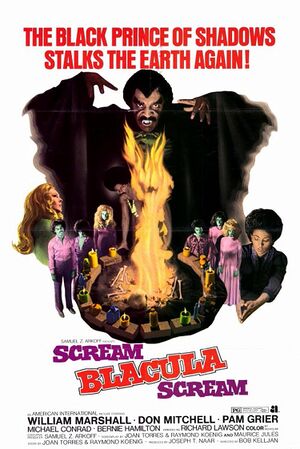
This was the slightly less successful sequel to 1972’s hit ‘Blacula’ (see below), which carries on with the story of Prince Mamuwalde, a proud African prince who was turned into a vampire by the original Dracula. He’s brought back to life by (ever present in blax-horror) voodoo and goes on a new bloodthirsty rampage in the urban ghetto. Again, the cast is made up of some of the best black actors of the 70s, playing some not so stereotypical black characters- some for laughs and some as archetypes with a black twist to them.
2. Sugar Hill (1974)

If there was one woman in the 70s that could give Pam Grier a run for her soul dollar, it would have to be the star of Sugar Hill, Marki Bey. And she never shined brighter or more beautifully as she did in Sugar Hill, as the widowed lover of a man gunned down by greedy Mafia man Robert Quarry. She pulls out the trusty voodoo dolls and beads and calls forth an avenging demon to bring a bevy of dead plantation slaves to life to exact that revenge in some disturbing and creepy ways. She is the perfect blend of beauty and danger.
1. Blacula (1972)

And the number one blaxploitation horror film is one that really is responsible for bringing about the blax-horror revolution-- the immortal Blacula. Starring William Marshall as Prince Mamuwalde, a proud African prince who pisses off Dracula while visiting his castle home, it brings the vampire legend to the streets and into the back alleys like no film before it. Marshall really brought a cultured sense to his bloodthirsty vampire, and a romantic angle when he finds what he takes as the reincarnation of his lost wife in actress Vonetta McGee. This is filled with the not so stereotypical Hollywood takes on black culture. And what a hell of a soulful soundtrack. This is a classic horror film. Get it in your collection ASAP.
--Nickolas Cook
